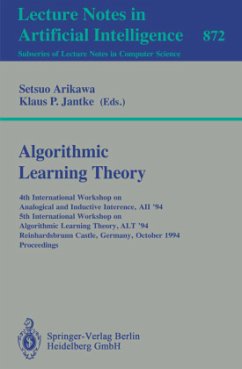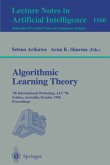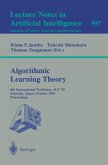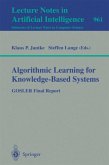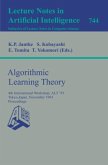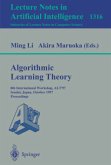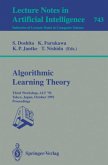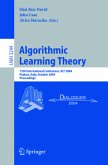Setsuo Arikawa / Klaus P. Jantke (eds.)4th International Workshop on Analogical and Inductive Inference, AII '94, 5th International Workshop on Algorithmic Learning Theory, ALT '94, Reinhardsbrunn Castle, Germany, October 10 - 15, 1994. Proceedings
Algorithmic Learning Theory
4th International Workshop on Analogical and Inductive Inference, AII '94, 5th International Workshop on Algorithmic Learning Theory, ALT '94, Reinhardsbrunn Castle, Germany, October 10 - 15, 1994. Proceedings
Mitarbeit:Arikawa, Setsuo; Jantke, Klaus P.
Setsuo Arikawa / Klaus P. Jantke (eds.)4th International Workshop on Analogical and Inductive Inference, AII '94, 5th International Workshop on Algorithmic Learning Theory, ALT '94, Reinhardsbrunn Castle, Germany, October 10 - 15, 1994. Proceedings
Algorithmic Learning Theory
4th International Workshop on Analogical and Inductive Inference, AII '94, 5th International Workshop on Algorithmic Learning Theory, ALT '94, Reinhardsbrunn Castle, Germany, October 10 - 15, 1994. Proceedings
Mitarbeit:Arikawa, Setsuo; Jantke, Klaus P.
- Broschiertes Buch
- Merkliste
- Auf die Merkliste
- Bewerten Bewerten
- Teilen
- Produkt teilen
- Produkterinnerung
- Produkterinnerung
This volume presents the proceedings of the Fourth International Workshop on Analogical and Inductive Inference (AII '94) and the Fifth International Workshop on Algorithmic Learning Theory (ALT '94), held jointly at Reinhardsbrunn Castle, Germany in October 1994. (In future the AII and ALT workshops will be amalgamated and held under the single title of Algorithmic Learning Theory.) The book contains revised versions of 45 papers on all current aspects of computational learning theory; in particular, algorithmic learning, machine learning, analogical inference, inductive logic, case-based reasoning, and formal language learning are addressed.…mehr
Andere Kunden interessierten sich auch für
![Algorithmic Learning Theory Algorithmic Learning Theory]() Setsuo Arikawa / Arun K. Sharma (eds.)Algorithmic Learning Theory39,99 €
Setsuo Arikawa / Arun K. Sharma (eds.)Algorithmic Learning Theory39,99 €![Algorithmic Learning Theory Algorithmic Learning Theory]() Klaus P. Jantke / Takeshi Shinohara / Thomas Zeugmann (eds.)Algorithmic Learning Theory39,99 €
Klaus P. Jantke / Takeshi Shinohara / Thomas Zeugmann (eds.)Algorithmic Learning Theory39,99 €![Algorithmic Learning for Knowledge-Based Systems Algorithmic Learning for Knowledge-Based Systems]() Algorithmic Learning for Knowledge-Based Systems39,99 €
Algorithmic Learning for Knowledge-Based Systems39,99 €![Algorithmic Learning Theory Algorithmic Learning Theory]() Klaus P. Jantke / Shigenobu Kobayashi / Etsuji Tomita / Takashi Yokomori (eds.)Algorithmic Learning Theory39,99 €
Klaus P. Jantke / Shigenobu Kobayashi / Etsuji Tomita / Takashi Yokomori (eds.)Algorithmic Learning Theory39,99 €![Algorithmic Learning Theory Algorithmic Learning Theory]() LiAlgorithmic Learning Theory39,99 €
LiAlgorithmic Learning Theory39,99 €![Algorithmic Learning Theory - ALT '92 Algorithmic Learning Theory - ALT '92]() Shuji Doshita / Koichi Furukawa / Klaus P. Jantke / Toyaki Nishida (eds.)Algorithmic Learning Theory - ALT '9239,99 €
Shuji Doshita / Koichi Furukawa / Klaus P. Jantke / Toyaki Nishida (eds.)Algorithmic Learning Theory - ALT '9239,99 €![Algorithmic Learning Theory Algorithmic Learning Theory]() Shai Ben David / John Case / Akira Maruoka (eds.)Algorithmic Learning Theory39,99 €
Shai Ben David / John Case / Akira Maruoka (eds.)Algorithmic Learning Theory39,99 €-
-
-
This volume presents the proceedings of the Fourth International Workshop on Analogical and Inductive Inference (AII '94) and the Fifth International Workshop on Algorithmic Learning Theory (ALT '94), held jointly at Reinhardsbrunn Castle, Germany in October 1994. (In future the AII and ALT workshops will be amalgamated and held under the single title of Algorithmic Learning Theory.)
The book contains revised versions of 45 papers on all current aspects of computational learning theory; in particular, algorithmic learning, machine learning, analogical inference, inductive logic, case-based reasoning, and formal language learning are addressed.
Hinweis: Dieser Artikel kann nur an eine deutsche Lieferadresse ausgeliefert werden.
The book contains revised versions of 45 papers on all current aspects of computational learning theory; in particular, algorithmic learning, machine learning, analogical inference, inductive logic, case-based reasoning, and formal language learning are addressed.
Hinweis: Dieser Artikel kann nur an eine deutsche Lieferadresse ausgeliefert werden.
Produktdetails
- Produktdetails
- Lecture Notes in Computer Science 872
- Verlag: Springer / Springer Berlin Heidelberg / Springer, Berlin
- Artikelnr. des Verlages: 978-3-540-58520-6
- 1994.
- Seitenzahl: 596
- Erscheinungstermin: 28. September 1994
- Englisch
- Abmessung: 235mm x 155mm x 32mm
- Gewicht: 772g
- ISBN-13: 9783540585206
- ISBN-10: 3540585206
- Artikelnr.: 09199254
- Herstellerkennzeichnung
- Springer-Verlag GmbH
- Tiergartenstr. 17
- 69121 Heidelberg
- ProductSafety@springernature.com
- Lecture Notes in Computer Science 872
- Verlag: Springer / Springer Berlin Heidelberg / Springer, Berlin
- Artikelnr. des Verlages: 978-3-540-58520-6
- 1994.
- Seitenzahl: 596
- Erscheinungstermin: 28. September 1994
- Englisch
- Abmessung: 235mm x 155mm x 32mm
- Gewicht: 772g
- ISBN-13: 9783540585206
- ISBN-10: 3540585206
- Artikelnr.: 09199254
- Herstellerkennzeichnung
- Springer-Verlag GmbH
- Tiergartenstr. 17
- 69121 Heidelberg
- ProductSafety@springernature.com
Towards efficient inductive synthesis from input/output examples.- Deductive plan generation.- From specifications to programs: Induction in the service of synthesis.- Average case analysis of pattern language learning algorithms.- Enumerable classes of total recursive functions: Complexity of inductive inference.- Derived sets and inductive inference.- Therapy plan generation as program synthesis.- A calculus for logical clustering.- Learning with higher order additional information.- Efficient learning of regular expressions from good examples.- Identifying nearly minimal Gödel numbers from additional information.- Co-learnability and FIN-identifiability of enumerable classes of total recursive functions.- On case-based represent ability and learnability of languages.- Rule-generating abduction for recursive prolog.- Fuzzy analogy based reasoning and classification of fuzzy analogies.- Explanation-based reuse of prolog programs.- Constructive induction for recursive programs.- Training digraphs.- Towards realistic theories of learning.- A unified approach to inductive logic and case-based reasoning.- Three decades of team learning.- On-line learning with malicious noise and the closure algorithm.- Learnability with restricted focus of attention guarantees noise-tolerance.- Efficient algorithm for learning simple regular expressions from noisy examples.- A note on learning DNF formulas using equivalence and incomplete membership queries.- Identifying regular languages over partially-commutative monoids.- Classification using information.- Learning from examples with typed equational programming.- Finding tree patterns consistent with positive and negative examples using queries.- Program synthesis in the presence of infinite number of inaccuracies.- On monotonicstrategies for learning r.e. languages.- Language learning under various types of constraint combinations.- Synthesis algorithm for recursive processes by ?-calculus.- Monotonicity versus efficiency for learning languages from texts.- Learning concatenations of locally testable languages from positive data.- Language learning from good examples.- Machine discovery in the presence of incomplete or ambiguous data.- Set-driven and rearrangement-independent learning of recursive languages.- Refutably probably approximately correct learning.- Inductive inference of an approximate concept from positive data.- Efficient distribution-free population learning of simple concepts.- Constructing predicate mappings for Goal-Dependent Abstraction.- Learning languages by collecting cases and tuning parameters.- Mutual information gaining algorithm and its relation to PAC-learning algorithm.- Inductive inference of monogenic pure context-free languages.
Towards efficient inductive synthesis from input/output examples.- Deductive plan generation.- From specifications to programs: Induction in the service of synthesis.- Average case analysis of pattern language learning algorithms.- Enumerable classes of total recursive functions: Complexity of inductive inference.- Derived sets and inductive inference.- Therapy plan generation as program synthesis.- A calculus for logical clustering.- Learning with higher order additional information.- Efficient learning of regular expressions from good examples.- Identifying nearly minimal Gödel numbers from additional information.- Co-learnability and FIN-identifiability of enumerable classes of total recursive functions.- On case-based represent ability and learnability of languages.- Rule-generating abduction for recursive prolog.- Fuzzy analogy based reasoning and classification of fuzzy analogies.- Explanation-based reuse of prolog programs.- Constructive induction for recursive programs.- Training digraphs.- Towards realistic theories of learning.- A unified approach to inductive logic and case-based reasoning.- Three decades of team learning.- On-line learning with malicious noise and the closure algorithm.- Learnability with restricted focus of attention guarantees noise-tolerance.- Efficient algorithm for learning simple regular expressions from noisy examples.- A note on learning DNF formulas using equivalence and incomplete membership queries.- Identifying regular languages over partially-commutative monoids.- Classification using information.- Learning from examples with typed equational programming.- Finding tree patterns consistent with positive and negative examples using queries.- Program synthesis in the presence of infinite number of inaccuracies.- On monotonicstrategies for learning r.e. languages.- Language learning under various types of constraint combinations.- Synthesis algorithm for recursive processes by ?-calculus.- Monotonicity versus efficiency for learning languages from texts.- Learning concatenations of locally testable languages from positive data.- Language learning from good examples.- Machine discovery in the presence of incomplete or ambiguous data.- Set-driven and rearrangement-independent learning of recursive languages.- Refutably probably approximately correct learning.- Inductive inference of an approximate concept from positive data.- Efficient distribution-free population learning of simple concepts.- Constructing predicate mappings for Goal-Dependent Abstraction.- Learning languages by collecting cases and tuning parameters.- Mutual information gaining algorithm and its relation to PAC-learning algorithm.- Inductive inference of monogenic pure context-free languages.

